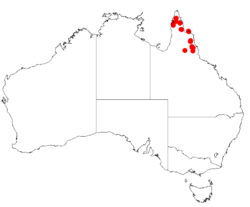Biology:Acacia armillata
| Acacia armillata | |
|---|---|
| Scientific classification | |
| Kingdom: | Plantae |
| Clade: | Tracheophytes |
| Clade: | Angiosperms |
| Clade: | Eudicots |
| Clade: | Rosids |
| Order: | Fabales |
| Family: | Fabaceae |
| Subfamily: | Caesalpinioideae |
| Clade: | Mimosoid clade |
| Genus: | Acacia |
| Species: | A. armillata
|
| Binomial name | |
| Acacia armillata Pedley
| |

| |
| Occurrence data from AVH | |
Acacia armillata is a tree of the genus Acacia and the subgenus Plurinerves that is endemic to north eastern Australia
Description
The tree can grow to a height of around 8 m (26 ft) and has pendulous branches[1] with glabrous and lenticellate branchlets.[2] It has rough grey coloured bark toward the base of the trunk that becomes smoother and more mottled above.[1] Like most species of Acacia it has phyllodes rather than true leaves. The evergreen, glabrous and thinly coriaceous phyllodes have a narrowly elliptic to lanceolate shape and are straight to shallowly sickle shaped. The phyllodes are 7.5 to 18 cm (3.0 to 7.1 in) in length and 5 to 35 mm (0.20 to 1.38 in) wide with four to ten main nerves.[2]
Distribution
It has a disjunct distribution throughout far north Queensland and is found in three localities separated by great distances from each other on or near the Great Dividing Range on Cape York Peninsula. These are the area around Iron Range Mining, the area around Mount Janet and surrounding the junction of Walsh River and Price Creek where it is usually found as a part of Eucalyptus normantonensis or Eucalyptus cullenii woodland communities.[2]
See also
References
- ↑ Jump up to: 1.0 1.1 "Acacia armillata". World Wide Wattle. Western Australian Herbarium. http://worldwidewattle.com/speciesgallery/armillata.php. Retrieved 20 September 2020.
- ↑ Jump up to: 2.0 2.1 2.2 "Acacia armillata (Pedley) Pedley". Wattle - Acacias of Australia. Lucid Central. https://apps.lucidcentral.org/wattle/text/entities/acacia_armillata.htm. Retrieved 20 September 2020.
Wikidata ☰ Q15289372 entry
 |

